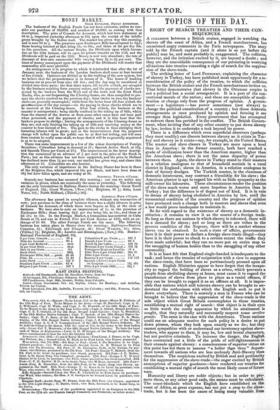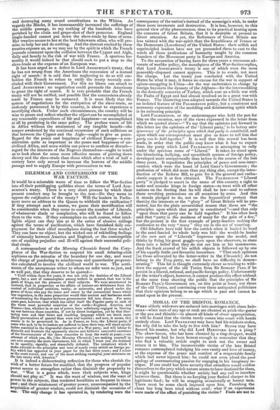TOPICS OF THE DAY.
RIGHT OF SEARCH TREATIES AND THEIR CONSEQUENCES.
A COLLISION between a British cruiser, engaged in watching the slavers off the coast of Africa, and a French merchantman, has occasioned angry comments in the Paris newspapers. The story told by the French captain (and it alone is as yet before the public) may be, and most probably is, exaggerated. The collision, however, and the irritation excited by it, are beyond a doubt ; and they are the unavoidable consequence of our persisting in worrying all nations into treaties conceding a right of search for the suppression of the slave-trade.
The striking letter of Lord PONSONNY, explaining the character of slavery in Turkey, has been published most opportunely for a reconsideration of the policy of the treaties, to which the collision between the British cruiser and the French merchantman invites us. That letter demonstrates that slavery in the Ottoman empire is not a political but a social arrangement. It is a part of the conventional morals of the nation ; and these are susceptible of modification or change only from the progress of opinion. A government — a legislature — has power sometimes (not always) to change the political constitution of a country ; but those domestic arrangements at once produced by opinion and forming it are stronger than legislation. Every government that has attempted to subvert them has perished in the conflict. The British Government, when inviting that of any other country to put down slavery by law, invites it to undertake a task beyond its power.
There is a difference which even superficial observers (perhaps they most readily) can discern between slavery as it exists in Turkey and slavery as it exists—say, for example, in the United States. The master and slave classes in Turkey are more upon a level than in America : in the former country, both have reached a grade of civilization lower than the American master, higher than the American slave ; there is not the same disparity of power between them. Again, the slaves in Turkey stand to their masters in a relation analogous to that of household menials in a rural district in England; slaves in America, in a relation analogous to that of factory drudges. The Turkish master, in the closeness of domestic intercourse, may contract a friendship for his slave ; the American planter is apt to regard his with as little sympathy as the mill-owner his labourers. These circumstances render the position of the slave much worse and more hopeless in America than in Turkey ; but the difference is of degree not of kind. It is in vain to dream of slavery being abolished in America by law, until the economical condition of the country and the progress of opinion have produced such a change both in masters and slaves that even a law would prove inadequate to maintain it.
So far with regard to the existence of slavery as a domestic institution: it remains to view it as the source of a foreign trade. So long as there are nations in which slavery is tolerated, there will be a demand for slaves; and so long as there are tribes in the present condition of the Negroes' there will be a market whence slaves can be obtained. In such a state of affairs, governments have it in their power to declare a foreign slave-trade illegal—they have it in their power to check to a certain extent the traffic they have made unlawful ; but they can no more put an entire stop to the smuggling of human bodies than to the smuggling of any other commodity.
It is at least felt that England single-handed is inadequate to the task; and hence the treaties of cooperation with a view to suppress the slave-trade, that have been so pertinaciously pressed upon all nations. English Ministries appear to have forgot that the incapacity to regard the holding of slaves as a crime, which prevents a people from abolishing slavery at home, must cause it to regard the transference of slaves from place to place as a venial offence, if they can be brought to regard it as an offence at all. It is impossible that nations which still tolerate slavery can be brought to understand the enthusiasm with which the 'English seek to put it down everywhere. There is scarcely a man in France who can be brought to believe that the suppression of the slave-trade is the sole object which Great Britain contemplates in those treaties, establishing a mutual right of search : that object is in their eyes so little worth the costly apparatus by which its attainment is sought, that they naturally and necessarily suspect some arriere pewee. The same is the case with the Americans. These nations could see an adequate motive for such policy in a desire to put down pirates, whom they look upon exactly as we do; but they cannot sympathize with or understand our inveteracy against slavetraders, who appear to them, it may be, low and brutal characters, but not positive criminals. To increase the danger, the English have contracted not a little of the pride of self-righteousness in their crusade against slavery : a consciousness of superior virtue on this point has led them to assume "a holier the thou" deportment towards all nations who are less zealously Anti-Slavery than themselves. The suspicions excited by British zeal and pertinacity for the suppression of the slave-trade—the anger excited by British assumptions of superior goodness—have rendered our treaties for establishing a mutual right of search the most likely cause of future wars.
Humanity and liberty are noble objects ; but in order to pro
mote them, or any other good ends, the means must be calculated. The coast-blockade which the English have established on the coast of Africa, at great expense, has not put a stop to the slavetrade, but it has been the cause of losing many valuable lives
and destroying many sound constitutions to the Whites. As regards the Blacks, it has immeasurably increased the sufferings of the middle passage, to say nothing of the hundreds who have perished by the chain and grape-shot of their protector. England single-handed cannot put down the slave-trade by force of arms. Her treaties secure to her at the best lukewarm allies, who will promise to help her and do nothing. And the distrust excited by these treaties exposes us, as we may see by the spirit in which the French journals comment upon the collision between the Cygnet and Aigle, daily and hourly to the risk of war with France. A spurious humanity it would indeed be that should seek to put a stop to the slave-trade at the expense of an European war. It has been urged as a defect in Lord ASHBURTON'S treaty, that he has not wrung from the Americans the concession of a mutual right of search : it is said that his neglecting to do so will embolden the French to refuse to ratify the treaty recently concluded with their Government. For this no blame can attach to Lord AsisnErirrozi : no negotiation could persuade the Americans to grant the right of search. It is very probable that the French treaty will not be ratified, and possible that the concessions already made by France may be retracted. It is most likely that the system of negotiations for the extirpation of the slave-trade, so zealously persevered in by this country, is about to experience a mortifying check. Under such circumstances, the country will be wise to pause and reflect whether the object can be accomplished at any reasonable expenditure of life and happiness—or accomplished at all by persisting in the same policy. The profuse waste of life in Africa without the attainment of any tangible benefit—the temper awakened by the continual recurrence of such collisions as that between the Cygnet and the Aigle—ought to give us pause. Regard for the peace and happiness of civilized Europe—a consideration quite as important as the peace and happiness of uncivilized Africa, and more within our power to confirm or disturb— regard for the interests of the Negroes themselves—ought to teach us to look about for some more effective means of putting down slavery and the slave-trade than those which after a trial of half a century have only served to increase the horrors of the middle passage and to supply Europe with provocatives to war.



























 Previous page
Previous page